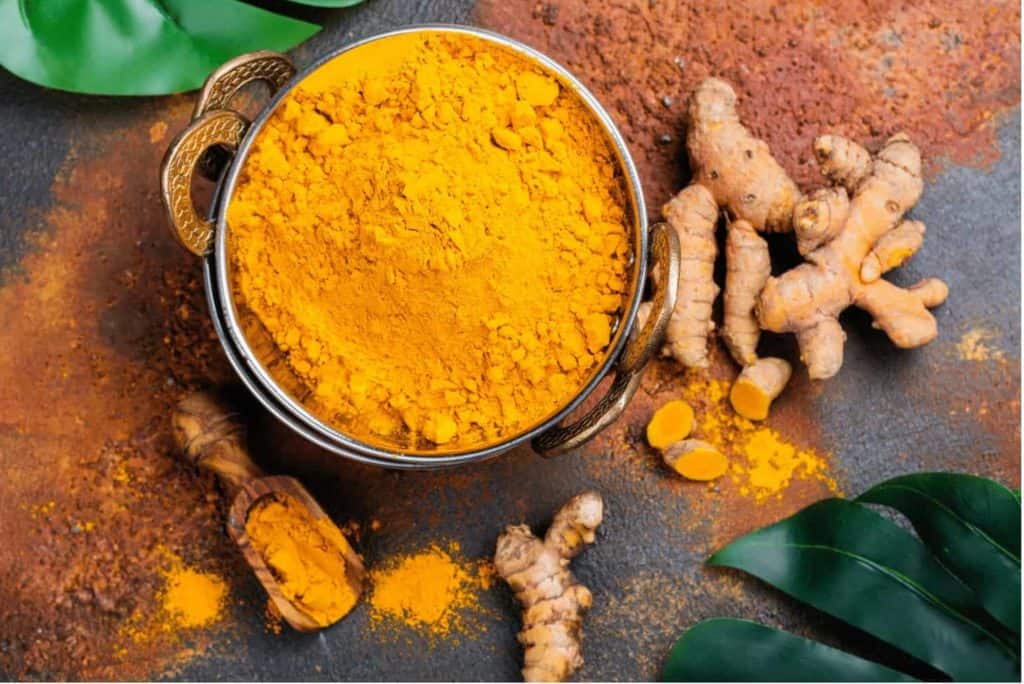
Tumeric The Golden Spice
Turmeric is well known in Asian cuisine since it’s often used as a food ingredient or flavoring. The golden spice is also popular in the world of medicine, especially in the Indian traditional Ayurvedic system of medicine.
Curcumin is the main component of turmeric that contributes most to its health benefits. The compound is high in anti-inflammatory and antioxidant substances.
Research suggests that turmeric may help people lose weight faster.![]()
But you may not know as to how effective the golden spice is and what dosage is recommended to get the best results.
In this post, you’ll learn if turmeric is really good for weight loss.
According to recent test-tube studies, the golden spice may indeed help you drop pounds.
- The studies showed curcumin’s apparent ability to reduce certain markers of inflammation associated with obesity
 . People who are obese often have high levels of these markers, which is why they tend to gain weight excessively.
. People who are obese often have high levels of these markers, which is why they tend to gain weight excessively. - In animal studies, curcumin was also found to have a role in increasing weight loss, cutting visceral fat, keeping lost weight off, and making the body less resistant to insulin.
- Meanwhile, a one-month study involving 44 participants who had a hard time trying to lose weight showed that consuming 800 mg of curcumin and 8 mg of piperine two times a day could significantly help reducing body fat, body mass index (BMI), and the size of waist and hip.
- Piperine is an alkaloid that can be found in black pepper. The role of piperine here is to increase the bioavailability of turmeric by up to 2,000%.
- 21 different studies involving more than 1,600 participants also confirmed curcumin’s associations with reduced fat, BMI, and waist size, in addition to elevated levels of adiponectin, an adipocyte-derived hormone that regulate glucose and lipid metabolism.
Despite the good results yielded by recent research, further studies with human subjects are needed to verify turmeric’s weight loss benefits.

Ultimate Turmeric Detox Tea
Ingredients
- 1/4 tsp ¼ teaspoon powdered turmeric
- 1 cup water, warmed
- 1 tbsp fresh lemon juice
- 1 tbsp All-natural Apple Cider Vinegar (ACV)
- 1/8 tsp Cayenne pepper powder
- 1 tbsp All natural Bee honey
Instructions
- In a medium-sized mug, add in the turmeric, lemon juice, ACV, pepper, and water. Pour warm water over the contents of the mug. Stir gently until well mixed.
- Enjoy this invigorating drink as an early-morning starter.
Nutrition
Lets Dig A little Deeper
The curcumin content in turmeric that has anti-inflammatory and antioxidant effects may have the capacity to work as a supportive supplement for weight loss. However, more human studies are essential to fully confirm this.
Turmeric and curcumin are generally safe to consume on a daily basis.
According to short-term research, turmeric doses of up to 8 grams every day pose a low risk to health. As for the long-term effects of consumption, more research is needed to find out about them.
It’s worth noting, though, that taking higher than recommended doses of this compound could cause side effects such as stomach pain, nausea, vomiting, diarrhea, constipation, skin rash, or allergies.
In addition, the use of turmeric isn’t recommended for people with the following conditions:
1) Diabetes
Regular consumption of turmeric along with diabetes medications may cause sugar levels to drop too low.
2) Bleeding Disorders
Turmeric may prevent certain clotting factors from forming, which may lead to problems in those with bleeding disorders.
3) Kidney Stones
The high oxalate content in the golden spice makes it unsuitable for consumption by kidney stone patients because the compound could bind to calcium in the intestines and worsen the condition.
4) Iron Deficiency
[grwebform url=”https://app.getresponse.com/view_webform_v2.js?u=yhX3C&webforms_id=27445103″ css=”on” center=”off” center_margin=”200″/]
Turmeric is among the spices known to limit iron availability in the body, thus taking it isn’t recommended for those who are iron deficient.
Other people who should also avoid these supplements are pregnant or breastfeeding women. The reason is that the golden spice is still not completely proven safe for these consumers.
It’s also possible that some manufacturers of turmeric products use inactive ingredients and don’t reveal them on the nutrition label. For this reason, it’s always a good idea to only buy supplements that have been tested and approved by an independent public health organization such as Informed Choice or NSF International.
Curcumin is known to interact with a number of medications, among which are antibiotics, anticoagulants, chemotherapy drugs, cardiovascular drugs, and antihistamines.
Check with your physician for personalized medical advice on whether you can use turmeric and curcumin supplements or not.
Summary
Both turmeric and its primary active component curcumin are generally considered safe. However, high doses can cause side effects. Also, some people shouldn’t take these supplements.
While turmeric is available in numerous forms, it’s most commonly used as spice blends.
It also comes in drink varieties like turmeric golden milk and ginger tea. The ingredients of the milk variant consist of heated milk, turmeric, black pepper, cinnamon powder, and ginger.
 In India, turmeric is often blended with tea alongside other ingredients such as black pepper, ginger, honey, coconut oil, and olive oil.
In India, turmeric is often blended with tea alongside other ingredients such as black pepper, ginger, honey, coconut oil, and olive oil.
The majority of studies involving human subjects suggest that turmeric only gives health benefits when taken at maximum doses, such as through curcumin supplements and turmeric extracts.
As for consumption as a spice, it only brings small effects, since the spice only contains around 2 to 8% curcumin, compared to extracts which can deliver roughly 95% curcumin.
A curcumin supplement works more effectively when it also packs black pepper, which increases the absorption and utilization of the compound.
While no official dosing recommendations are available for these supplements, the majority of studies conclude that taking 500 to 2,000 mg every day is enough to get their health benefits.
It should be noted that consuming a large dosage of turmeric for more than 2 to 3 months isn’t recommended, since there haven’t been any long-term studies to determine the side effects.
When it comes to aiding weight loss, turmeric might be among the least recommended remedies to use. However, there are still many other benefits that the golden spice has to offer, including reducing your risk of heart and brain diseases.
Be sure to tell your doctor about any supplements you’re consuming, including turmeric and curcumin.
Conclusion
Thanks to its versatility, turmeric is great to be used both as a cooking ingredient and as a supplement, although more studies are required to confirm its weight loss benefits.
There are still other beneficial effects that one can get by consuming turmeric, though, including improving heart and brain health.
Turmeric and its main active ingredient curcumin are generally recognized as safe, although you should seek professional medical advice in case you want to make sure if it’s really good for you.
Recent Posts
Macro Calculator How-to Count Macros for Keto, IIFYM, Low Carb
How to Count Macros a Step by Step Guide "Counting macros" is commonly used by individuals looking to gain muscle mass or shed weight. Counting macros entails keeping track of the food types you...
TOP 10 BENEFITS OF USING APPLE CIDER VINEGARWe truly believe that apple cider vinegar should be in your health supplement arsenal as it has proven to have some major that has major health...


